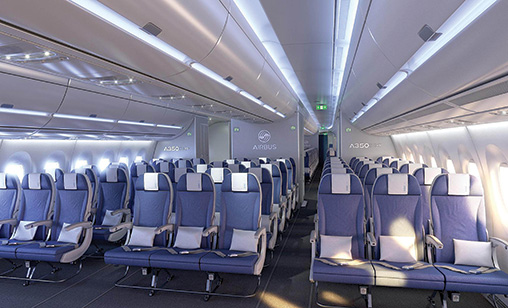Industry Addendum
French engine maker buys troubled Zodiac
February 1st 2017
In January, Philippe Petitcolin, the 64-year-old CEO of French aircraft engine manufacturer, Safran SA, signed off on a Euros 8.5 billion (US$9.125 billion) deal for French aircraft cabin manufacturer, Zodiac Aerospace SA, creating in the process Europe’s largest aerospace supplier. Read More »
Seven years ago it was not so successful. In 2010, it made overtures to purchase the company but backed away from a bid in the face of a hostile reaction to the offer from Zodiac’s board.
 |
Safran, formed from the merger of Snecma Engines and security group, Sagem, in 2005 is one of Europe’s most successful manufacturing companies. It produces, in a joint venture with the U.S.’s GE, the CFM engine, the biggest selling aircraft engine in the world.
At press time, it is calculated the merger will produce Euros 200 million in near-term savings. It also will facilitate Zodiac’s recovery from a three-year period of missed deadlines and production of below standard aircraft cabin equipment, particularly the lavatories ordered by initial customers of the new A350 aircraft.
Airbus and Boeing are pressing suppliers for discounts for aircraft cabin equipment in response to airline customer pressure for deeper discounts on aircraft purchases.
Earlier this month, Airbus COO and president Airbus Commercial Aircraft, Fabrice Bregier, said the problems at Zodiac had eased in the final three months of last year. Zodiac has developed new seat shells at its U.S. manufacturing plant and has re-designed its lavatory suites.
Safran’s acquisition of Zodiac follows the decision three months ago by Rockwell Collins Inc. to buy Zodiac rival, B/E Aerospace, for US$6.4 billion plus $1.9 billion in debt. North American B/E Aerospace is the largest aircraft cabin interiors manufacturer in the world.
IFS promises better disruption management at airlines
Airlines are in constant search of more efficient fleet utilization, maintenance and fuel applications. British company, IFS, has a new operations solution it says will take the guess work out of airline fleet disruption management.
When an aircraft has to be withdrawn from service for any number of different reasons, the process of finding the appropriate replacement has to be completed manually by an airline’s operation’s planning team. Issues to be taken into account include available aircraft and their locations, maintenance schedules, efficient fuel utilization and the suitability of available aircraft for the route.
Global enterprise applications company, IFS, said it can make life easier in these circumstances with its new 24/7 tail planning and maintenance allocation program, Optimisation and Assignment Solution.
IFS’s Dubai-based solutions manager, Andrew Stimpson, said the new IFS product, which has several competitors in the market, decides the aircraft best suited to fly on a route by using technology to manage the scores of constraints that must be considered.
Examples of constraints would be an airfield that is not physically capable of accepting an A380. Another would be an airplane with a broken Auxiliary Power Unit (APU) that would need an airport with ground support. A legal constraint could be a regulator’s demand that every aircraft must be certified and approved before it can fly to the designated destination.
“The difficulty is the sheer volume of constraints to be processed to put the appropriate and most fuel efficient aircraft on a route,” said Stimpson.
IFS said its tail planning solution can be a key decision-making support system for airlines by delivering a recovery plan when airlines experience a flight disruption. Its data system provides operations staff with essential flight readiness information, MRO schedules, line maintenance, suitability of aircraft for airport landings and take-off and maximum fuel utilization . At many carriers, these processes are lengthy because they are performed manually and not with IT management systems.
Just how expensive is the solution? IFS would only say it would “be attractive for the customer”. “Big airlines obviously extract more benefit from it,” said Stimpson. “We would say around 40 aircraft is probably the point where doing this job manually is not really feasible.”
The IFS scheduling engine “works on a dynamic scheduling basis which means it can sit there constantly occupied when problems are occurring, accepting changes to constraint data and only changing that part of the schedule which is impacted. That’s really powerful for two reasons: if you have had grounding for 20 hours and it will impact a certain sub-fleet type, the IFS system does not start from scratch so we come up with a solution much more quickly. Secondly, the IFS solution can minimize schedule changes, which in turn reduces schedule disruptions, both immediately and further down the line.”
Airbus expands Silicon Valley data mining partnership
 |
Silicon Valley data mining company, Palantir, and Airbus, have agreed to a multi-billion dollar partnership intended to accelerate production of A350 aircraft and also save the aircraft manufacturer hundreds of millions of dollars, the Financial Times reported last month.
Palantir, established two decades ago as a security company, is reported to have been working with Airbus for 18 months. The partnership recently has expanded to eight projects across four countries including final assembly of the A350, the newspaper said.
Airbus CEO Tom Enders said the manufacturer used Palantir’s technology to enable its engineers to respond more rapidly to production problems and also to improve output processes.
Keeping the A350 program, which has suffered delays because of missed delivery deadlines and the failed performance of furnished cabin equipment, “largely on track” would save Airbus a significant amount of money, he said.
“In these ramp ups, you can easily overspend by hundreds of millions of dollars. Our airline customers are benefitting because they get aeroplanes faster, without delays and with better quality and operational availability,” Enders said.
Japan Air Commuter launches new era with ATR
Japan Air Commuter (JAC) became an new ATR airline with the delivery of the first of nine ATR 42-600s to the Japan Airlines (JAL) subsidiary last month. JAC, 60% owned by JAL, signed its first commitment for ATR aircraft in mid-2015 after the airline determined its fleet modernization strategy. The aircraft will fly on trunk routes and also to island and small community destinations in its network.
All Japanese airlines are expanding and/or renewing their fleets as tourists to Japan are forecast to reach 40 million a year by 2020, the year of the Olympic Games in Tokyo.
Based in Kagoshima, Kyushu, JAC was established in 1983 by JAL and the 12 municipalities of the Amami islands in western Japan. It has 19 aircraft and operates 97 flights a day to 23 destinations.
SITA appoints global leaders in Singapore
Air transport provider, SITA, has promoted Sumesh Patel to SITA president Asia-Pacific. Patel, who will remain based in Singapore, was formerly SITA’s vice president business management Asia Pacific. He holds an MBA from the National University of Singapore.
His predecessor, Canadian Ilya Gutlin, who also will remain in Singapore, is SITA’s new global president air travel solutions. He began his career at Ernst and Young before he joined SITA as a financial controller. He graduated in commerce from Canada’s McGill University and has completed an INSEAD executive leadership program.
SITA CEO, Barbara Dalibard, said in a statement: “The Asia Pacific has a strong role in the development of the air transport industry as airlines and airports look to technology to support the region’s fast growth.”
| IN BRIEF AIRLINES: China Airlines and Japan Airlines strengthen co-operation Taiwan’s China Airlines and Japan Airlines signed a Memorandum of Understanding last month to expand their passenger and cargo strategic co-operation. The two airlines will expand their code-share agreement to include all routes they operate between Taiwan and Japan. The partnership, which will commence mid this month, will expand from 28 flights a week between Songshan and Haneda to as much as 240 flights a week depending on seasonal demand. MRO: New Lufthansa Logistik boss |